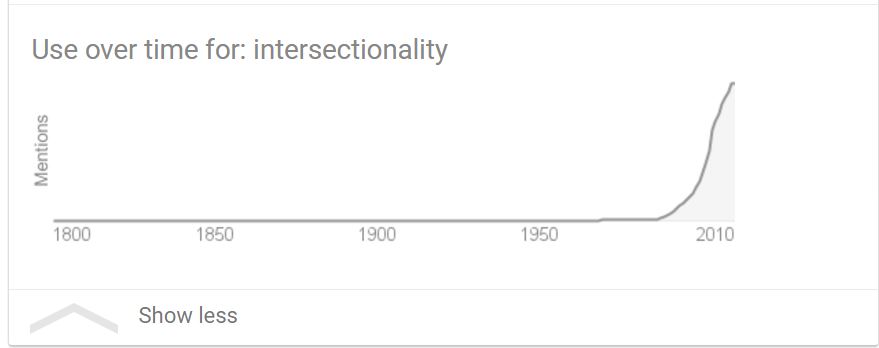With all the drama unfolding in the White House, I find myself with an inexplicable urge to define certain terms that have become part of the background noise of my thoughts.
INTER–SECTIONAL-ITY
Word Birth

The term was “coined by legal scholar Kimberlé Crenshaw” in 1989. “Inter” – latin meaning between or among; sectional, section – “that which is limited to a section” or “a part that is cut off or separated.” “-Ity” – the state of (when attached to intersectional) being between sections or among sections.
Word Background
Usually, a word that resides with scientific, technical and mathematical theory now is used to express a social state that is coming into focus to the degree of possessing sound. What I mean by possessing sound is this word was spoken with volume, intensity, and repetition much later in the 20th century. It was not even conceived of as a notion before 1989. It was just a reality people subconsciously lived in without a word to express it.
Word Definition – Officially
From Dictionary.com:
“the theory that the overlap of various social identities, as race, gender, sexuality, and class, contributes to the specific type of systemic oppression and discrimination experienced by an individual”
“the oppression and discrimination resulting from the overlap of an individual’s various social identities”
Intersectionality and Me
What are my intersections according to the definition above? I am black. I am female. I am straight. Class is difficult for me because I fluctuate, but for now, I’m lower-middle (more parsing of that in a later post). I’m older (that is as honest as I’m going to get about that).
Intersectionality vs Social Currency
Intersectionality expresses social categorization and the different oppressions experienced. In contrast, social currency is your ease of ability to move within a group or population due to how you (or they) perceive your attributes, characteristics (physical or otherwise) and the value they assign to those pieces of you.
Social Currency I’ve Observed – “Pretty”
I am a beauty monger. I notice pretty things and pretty people. They make me feel a certain way. With that said, I recognize that I have assigned a value to the subjective state of “pretty.” I also realize that I am not alone in this recognition or act of assigning a value (right or wrong).
Perceived Social Currency of Different Intersections
Brace yourself! This blog will not just be about stereotypes of any and all kinds that I have been fed over the years but the observed ease of mobility and social value placed upon different intersections by men, women, systemic dynamics, pop culture, and family groups. (This may be so meaty, I may have to make follow-up posts).
Blog Purpose
As a “Black” woman, I was raised and surrounded by the message to be aware of the male gaze at all times. My awareness of the male gaze would not be for gain, but for protection. In follow-up posts I will describe my observations of the male gaze as it applies to different color groups of women — specifically “white” women and their perceived social currency of “pretty.”
Additionally, with this blog, I want to explore my observations of “pretty” as a social currency and its links to the false narrative of “race.” My exploration will also include my observations of the male gaze in American social heirarchy and the culture it creates.
The impact of the incessant dialogue about made up races and the delusion that they impact society and create anxiety is also an interesting conversation I would like to breach. What is actually creating social angst is the human psyche, the ego, the id, the subconsicous and consciousness and their complex and messy interactions with self, environment and the feared “other.”
We tend to delude ouselves as human beings that the limited view from which we operate is all we need in the moment to assess, analyze, and act upon a dangerous, a beneficial, or a neutral happening.
I will always end with a call to action to follow, share, subscribe, comment, reach-out or create a conversation based on the blog posts I create. I want to start the conversation. I want to have the conversation. I want to invite you to engage in the conversation with me. I enjoy speaking with experts and laymen alike to accomplish killing my ignorance about any and ambitiously all subjects.
Next Post: 1st Observed Intersection — The Male Gaze, “Pretty”, “White”, and Women